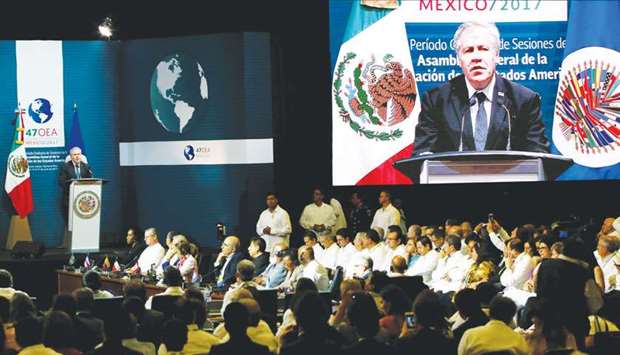Foreign ministers from across the Americas failed to reach agreement at a meeting on Monday on a resolution criticising the government of Venezuela, which saw more violent protests in its capital as the discussions deadlocked in Mexico.
Ministers from the 34-nation Organisation of American States (OAS) met in Mexico after they were unable to reach a consensus statement in May on the political and economic crisis rocking Venezuela.
Guatemalan Foreign Minister Carlos Morales, the acting chair of the meeting, suspended a session to work out a joint statement on Venezuela and said that ministers would resume discussions at a later, unspecified date.
“I do not want our hemisphere to continue breaking apart anymore,” Morales said. “We need to look for solutions, to continue the dialogue and the only way to continue this dialogue is to keep this session open without a determinate date.”
Mexico, the United States and other countries had been lobbying OAS member states to adopt a watered-down Venezuela resolution after seeing resistance from some of the socialist oil exporter’s allies.
Twenty states voted to pass a draft, but 23 votes were needed to approve the statement.
Eight countries abstained from voting while five rejected the draft.
Venezuela has said it is leaving the OAS and did not vote.
“Some states were not prepared to sign a statement that there are political problems in Venezuela,” Guyana’s Foreign Minister Carl Greenidge told Reuters on the sidelines of the meeting.
Mexico and Peru have led the push with the United States for a resolution that defends representative democracy in Venezuela, where President Nicolas Maduro is accused of leading the Organisation of Petroleum Exporting Countries (Opec) member toward dictatorship by delaying elections, imprisoning opposition activists, and pressing to overhaul the country’s constitution.
In Caracas on Monday, Venezuelan opposition activists battled security forces at one of the largest demonstrations in recent weeks after more than two months of almost daily street clashes.
“We don’t expect much of the international community,” said protester Luis Serran, 22. “We have seen cases like Syria, lots of talking and not much action.”
At least 72 people have been killed in two months of violence between protesters and police as Venezuelans decry shortages of food and medicine.
Maduro says the protests, along with the diplomatic efforts, are part of a plot by the United States to topple him.
“Venezuela needs an international humanitarian channel that provides drugs and food to the Venezuelan population,” OAS secretary general Luis Almagro said.
Almagro called for an election timetable in Venezuela, for political prisoners to be freed, an independent judiciary and respect for the autonomy of the National Assembly legislature.
While Venezuela has said that it was withdrawing from the organisation in protest, Foreign Minister Delcy Rodriguez was in Cancun.
“We don’t recognise this meeting nor do we recognise the resolutions that come from it,” she said.
Venezuela’s socialists have long enjoyed the support of left-leaning governments in Latin America loath to back measures they see as meddling in a sovereign country by an organisation that they consider an arm of US foreign policy.

OAS chief Almagro addresses the audience during the opening ceremony of the organisation’s 47th General Assembly in Cancun.
